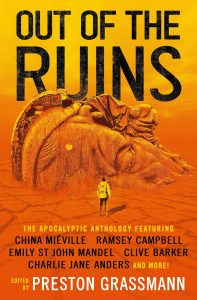Rich Horton Reviews Short Fiction: Out of the Ruins, Asimov’s, and Analog
 Out of the Ruins, Preston Grassman, ed. (Titan) September 2021.
Out of the Ruins, Preston Grassman, ed. (Titan) September 2021.
Asimov’s 11-12/21
Analog 11-12/21
Out of the Ruins is an anthology about life in the ruins following an apocalypse (of whatever sort). It features a roughly even mix of original stories and strong reprints. Of the new stories, “Malware Park” by Nikhil Singh, is very impressive, and challengingly constructed – the narrator disjointedly telling of the all-male town of Neurocropolis and his desperate attempts at modifying (upgrading? Just altering?) a doll (perhaps?) called Phaedra or Phoneutria. The rush of narrative is purposely disorienting, I think (at least I was disoriented) and the effect is powerful. I also really liked Nina Allan’s “A Storm in Kingstown”, set in a city in time of plague, and under the rule of a “witchfinder” who blames what he calls witches for the plague. The story concerns Doris, a middle-aged woman who runs an inn and who has taken in young Saira Giddings. Now Saira has run away – amid hints of having found something mysterious that seems surely witchcraft. The story doesn’t tell us right away what’s really going on, letting the revelations about what Saira has found, and when the story must be set, be revealed in good time, and fascinatingly.
In the November-December Asimov’s, “La Terrienne” by John Richard Trtek is a great deal of fun. The main character is one Monsieur Picot, a Frenchman exiled from far-future Earth for obscure reasons. He is the Highest Factor for the Seventeen Systems of the Shalaf Locality; that is, he works for one of the superior alien races in this segment of the Galaxy. As far as he knows, he is the only human in the Seventeen Systems, and yet he sees a human woman as he eats breakfast one morning. Of course he must investigate, and of course there is intrigue at hand, involving other alien races, and a human woman but not the one he thought he saw, and a little careful side dealing, and alien rivalries. Lovely, old fashioned colorful SF – the blurb suggests a resemblance to Vance, which I didn’t quite detect, but nonetheless it’s delightful work, and I hope to see more of M. Picot.
Misha Lenau is a name new to me, and “Bread and Circuits” is an impressive SF debut. Nadia is a former neural network researcher who can no longer work due to the constant pain (and “fog”) caused by fibromyalgia. Instead, Nadia has an “orphanage,” which we soon learn is for abandoned smart machines that have become sentient. The latest arrival is a smart toaster that wants to commit suicide, which isn’t something Nadia wants to help with. The story effectively mixes the plaintively humorous “quirks” of the smart machines in the orphanage with a moving meditation on loneliness, pain, and possible friendship among intelligences of all sorts. The title character of Ray Nayler’s fine new story “Muallim” is another smart machine. Muallim is a robot attempting to serve as a teacher in an isolated village in Azerbaijan. We witness its struggles with its small class, the difficulties the local blacksmith has in maintaining Muallim with her limited tools, and the reaction of a UN representative faced with what she perceives as a failed initiative, not perceiving that the village, and Muallim itself, are more than she thinks.
The best story here is by Gregory Feeley. “Striding the Blast” is set on Mercury – or Hermes – in the distant future. The planet has been lightly terraformed (perhaps “terraforming” isn’t the right word) and so it has an atmosphere, and tremendous winds. Aurelia Tektonikos, who stole the Kerykeion from one of the godlike (or so they think) posthumans of this world, has been captured, and punished, and now is impressed into entering a race around the world, her only equipment a set of wings. Such a feat should be impossible – and maybe it is, but Aurelia faces a different fate, and she will meet an unexpected set of beings. Perhaps I’ve said too much – the story is simply fascinating throughout, echoing mythology in telling of this posthuman future, and honest about the realities of this culture while hinting that it is deeper and more varied than its rulers imagine, and offering a slight hope of the growth of something new. The story is also, I should add, fabulous “hard SF,” with believable speculations and intriguing “sufficiently advanced” technology.
Analog’s final 2021 issue has a fine, quiet piece from Dan Reade, “An Hour to Ames”. Rachel’s mother is dying. Rachel’s relationship with her mother was, at best, complicated. She finds herself avoiding visiting her, instead sending her android assistant who can act as sort of an avatar of Rachel. This predictably causes her guilt, exacerbated by her aunt’s complaints. But, she learns, her aunt has her own issues, and the story very skillfully uses the modest SFnal element – and Android assistants – to help interrogate some involving questions about family.
Recommended Stories
“A Storm in Kingstown”, Nina Allan (Out of the Ruins)
“Striding the Blast”, Gregory Feeley (Asimov’s 11-12/21)
“Muallim”, Ray Nayler (Asimov’s, 11-12/21)
“An Hour to Ames”, Dan Reade (Analog 11-12/21)
“Malware Park”, Nikhil Singh (Out of the Ruins)
“La Terrienne”, John Richard Trtek (Asimov’s 11-12/21)
This review and more like it in the January 2022 issue of Locus.
 While you are here, please take a moment to support Locus with a one-time or recurring donation. We rely on reader donations to keep the magazine and site going, and would like to keep the site paywall free, but WE NEED YOUR FINANCIAL SUPPORT to continue quality coverage of the science fiction and fantasy field.
While you are here, please take a moment to support Locus with a one-time or recurring donation. We rely on reader donations to keep the magazine and site going, and would like to keep the site paywall free, but WE NEED YOUR FINANCIAL SUPPORT to continue quality coverage of the science fiction and fantasy field.
©Locus Magazine. Copyrighted material may not be republished without permission of LSFF.





